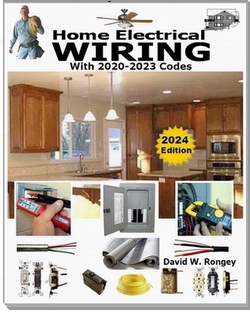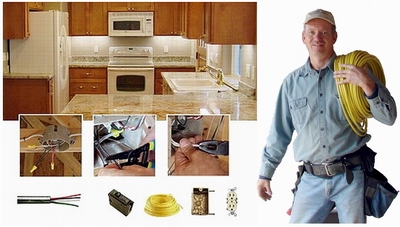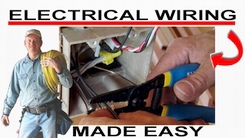Is Your Contractor Doing It Right?
 '; ';
|
How a Homeowner Can Know if their Contractor is Great or a Fake – Both the homeowner and the electrical contractor should never assume anything, but rather ask questions and make sure every detail is agreed on and understood. © By: Dave Rongey |
How a Homeowner Can Know if their Contractor is Great or a Fake
Electrical Question: I’m having a contractor extend an existing covered patio out another 15 feet.
- The existing cover was wired by the builder using 12 gauge wire.
- The contractor used 14 gauge wire for the new cover.
- One switch in the house controls all patio cover lights (old and new) and another switch controls both ceiling fans (one old and one new). I have a 20 amp circuit.
Is this configuration OK?
Background: Scott, a Homeowner from Katy, TX
Dave’s Reply:
Thanks for your electrical question Scott.
Is Your Contractor Great or a Fake?
Homeowners and (some so-called) Contractors
Is Your Contractor Installing the Right Electrical Wiring?
- Scott, if the contractor installed #14 gauge wire and connected the #14 gauge wire to #12 gauge wire then no, this is incorrect electrical wiring.
- When extending electrical wiring to existing wiring the wire size should be the same gauge, otherwise the integrity of the electrical circuit has been compromised and could cause a potential hazard to the incorrect smaller wire size.
- The contractor who is performing this work should be doing all of the work with a permit and having the work inspected.
- If your contractor is doing this work without a permit then I would question the contractors integrity and start asking questions, or even consider finding a different contractor.
Is Your “Contractor” Legitimate?
Find out for sure if the worker is really a contractor, and I mean a Licensed Contractor. Ask to see their business card and check them out with your state contractors licensing agency. If your contractor is performing work without a permit, then I would start asking more questions, after all, it is your house!
Making Sure Your Project is Done Right
- All building projects including electrical wiring should be permitted through your local building department or authorizing agency and all the work should be inspected and signed off as complete.
More about Electrical Contractors and Homeowners
[ad#block] Home Improvement Question: Hi, my question is about the electrical community standard practice, regarding electrician error vs homeowner change-order. How would you have handled this with the homeowner?
In a whole-house gut renovation rough-in, the electrical contractor’s assistant begins wiring outlets in back bedrooms. The old boxes, installed 40 years ago, are only 6″ off the floor, assistant pops new boxes in same spots. After six outlets, the homeowner arrives to say “you didn’t ask where I wanted them! I want them 22″ from the floor. You should have asked, since 6″ is so odd.” (There’s been much conversation about how homeowner plans to grow old here, with ADA accommodations.) Drywall gone on exterior walls in one of three rooms rewired, insulation in miserable shape, the electrical contractor informed all drywall is coming down (so no reason to avoid cutting another hole.) EC raises outlets, rewiring each since first wire not long enough (coming from underneath). The homeowner feels this is electrical contractors error, electrical contractor says nothing about extra charges to correct it.
Homeowner overpays EC along the way. Seven months later (yes), when violations finally being cleared, electrical contractor refuses to refund extra, in part by charging homeowner additional 300+% of original outlet costs to raise them. (original charge $25 each, move charge 5 hours labor at $85/hr, plus $45 for extra wire)
How would you have handled this with homeowner? Thanks!
Dave’s Reply:
Thanks for your electrical question Scott.
I really do not like to get in the middle of a problem like this, however here is my suggestion to avoid problems between the homeowner and the electrical contractor for a home improvement project.
The project should start with a well defined set of plans and an approved contract with the homeowner which reflects the set of plans.
Changes with anything having to do with the contract should be submitted in the form of a change order which should be approved and signed by the homeowner before the change is made.
Problems with the contractors employees and the work that is being performed should be brought to the attention of the contractor right away and dealt with.
If the homeowner is not happy with the project then the final payment may be withheld until the situation is taken care of.
In short, most home improvement problems can be avoided with good communication. Both the homeowner and the electrical contractor should never assume anything, but rather ask questions and make sure every detail is agreed on and understood.
Electrical Wire for the Home
How to Install Ceiling Fans and Wiring
Step-by-step pictures – Easy wiring diagrams and installation guide – Light and fan switch variations.
Wiring Ceiling Fans
How to Install Ceiling Fans
Take the mystery out of ceiling fan wiring. Ceiling Fans are a great way to lower your energy bill and brighten up one of your favorite rooms.
Electrical Circuits

Electric Circuit Listing
The size of the home electrical service panel is designed by calculating the square footage of the home and factoring in the code requirements for the electrical circuits that are required.
Electrical Wire
Electrical Wire for the Home
Complete listing of electrical wire types and parts used for home projects with electrical code information serves as selection guidelines.
For more information about Rewiring a Home
Rewiring a Home
Rewiring a Home
Great ideas for home electrical rewiring that will add value to your home and bring it up to the current safety and energy efficient electrical codes.
The following may also be helpful for you:
Be Careful and Be Safe - Never Work on Energized Circuits!
Consult your Local Building Department about Permits and Inspections for all Electric Wiring Projects.
More articles about Electrical Contractors and Home Electrical Wiring: |
|
| « Previous | Next » |
Four Way Light Switch Wiring for Light Fixtures |
The Many Uses for Pilot Light Switches |
















